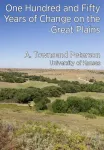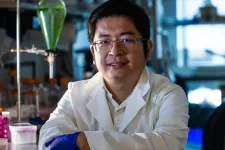(Press-News.org) BINGHAMTON, N.Y. -- When ChatGPT and other generative artificial intelligence can produce scientific articles that look real — especially to someone outside that field of research — what’s the best way to figure out which ones are fake?
Ahmed Abdeen Hamed, a visiting research fellow at Binghamton University, State University of New York, has created a machine-learning algorithm he calls xFakeSci that can detect up to 94% of bogus papers — nearly twice as successfully as more common data-mining techniques.
“My main research is biomedical informatics, but because I work with medical publications, clinical trials, online resources and mining social media, I’m always concerned about the authenticity of the knowledge somebody is propagating,” said Hamed, who is part of George J. Klir Professor of Systems Science Luis M. Rocha’s Complex Adaptive Systems and Computational Intelligence Lab. “Biomedical articles in particular were hit badly during the global pandemic because some people were publicizing false research.”
In a new paper published in the journal Scientific Reports, Hamed and collaborator Xindong Wu, a professor at Hefei University of Technology in China, created 50 fake articles for each of three popular medical topics — Alzheimer’s, cancer and depression — and compared them to the same number of real articles on the same topics.
Hamed said when he asked ChatGPT for the AI-generated papers, “I tried to use exact same keywords that I used to extract the literature from the [National Institutes of Health’s] PubMed database, so we would have a common basis of comparison. My intuition was that there must be a pattern exhibited in the fake world versus the actual world, but I had no idea what this pattern was.”
After some experimentation, he programmed xFakeSci to analyze two major features about how the papers were written. One is the numbers of bigrams, which are two words that frequently appear together such as “climate change,” “clinical trials” or “biomedical literature.” The second is how those bigrams are linked to other words and concepts in the text.
“The first striking thing was that the number of bigrams were very few in the fake world, but in the real world, the bigrams were much more rich,” Hamed said. “Also, in the fake world, despite the fact that were very few bigrams, they were so connected to everything else.”
Hamed and Wu theorize that the writing styles are different because human researchers don’t have the same goals as AIs prompted to produce a piece on a given topic.
“Because ChatGPT is still limited in its knowledge, it tries to convince you by using the most significant words,” Hamed said. “It is not the job of a scientist to make a convincing argument to you. A real research paper reports honestly about what happened during an experiment and the method used. ChatGPT is about depth on a single point, while real science is about breadth.”
To further develop xFakeSci, Hamed plans to expand the range of topics to see if the telltale word patterns hold for other research areas, going beyond medicine to include engineering, other scientific topics and the humanities. He also foresees AIs becoming increasingly sophisticated, so determining what is and isn’t real will get increasingly difficult.
“We are always going to be playing catchup if we don’t design something comprehensive,” he said. “We have a lot of work ahead of us to look for a general pattern or universal algorithm that does not depend on which version of generative AI is used.”
Because even though their algorithm catches 94% of AI-generated papers, he added, that means six out of 100 fakes are still getting through: “We need to be humble about what we’ve accomplished. We’ve done something very important by raising awareness.”
END
New tool detects fake, AI-produced scientific articles
Binghamton University researcher develops xFakeSci to root out bogus research
2024-09-03
ELSE PRESS RELEASES FROM THIS DATE:
New study uncovers key mechanisms responsible for the transformation of adult progenitors into brain tumors
2024-09-03
NEW YORK, September 3, 2024 — A new study from researchers with the Advanced Science Research Center at the CUNY Graduate Center (CUNY ASRC) sheds light on why certain oligodendrocyte progenitor cells (OPCs) in the adult brain transform into gliomas, the most common and incurable type of adult brain tumors. Previous work identified OPCs — dividing cells in the adult brain that play a crucial role in the brain's maintenance — as one of the brain cell types that give rise to these tumors.
“OPCs are often described as a double-edged ...
Kinsey Institute distinguished research scientist wins ISPNE 2024 Bruce Mcewen Lifetime Achievement Award for groundbreaking research on oxytocin and social behavior
2024-09-03
Dr. C. Sue Carter, Distinguished Research Scientist and Director Emerita of the Kinsey Institute, has been awarded the 2024 Bruce McEwen Lifetime Achievement Award by the International Society of Psychoneuroendocrinology. This prestigious award recognizes Dr. Carter’s lifetime of pioneering research that has significantly advanced our understanding of the biological and social underpinnings of human behavior.
A career biologist, Dr. Carter specializes in the endocrinology of love and social bonds. Dr. Carter is renowned for her discovery of the critical role of oxytocin in social bonding, stress management, and emotional ...
New species of pāua found
2024-09-03
The naming of a new species of pāua further highlights the importance of biodiversity research in Aotearoa.
Described in a study led by the University of Otago – Ōtākou Whakaihu Waka and the Museum of New Zealand Te Papa Tongarewa, the species, Haliotis pirimoana, is only found at Manawatāwhi Three Kings Islands, off the northern North Island.
Lead author Kerry Walton, an invertebrate curator at Te Papa who is undertaking his PhD in the Department of Zoology, says this is one of many species that are only found on Manawatāwhi.
“We are facing a biodiversity crisis. Species around the world are going ...
NFL PLAY 60 and the Nation of Lifesavers programs kickoff for 2024 season
2024-09-03
DALLAS, Sept. 3, 2024 — Today at Three Trails Elementary School in Independence, Mo. the American Heart Association, the Kansas City Chiefs and the National Football League (NFL) kicked off two programs rooted in proven American Heart Association science in advance of the 2024 NFL season kickoff. NFL PLAY 60™ supports students’ mental and physical health reducing sedentary behavior and increasing physical activity are key to immediate and long-term health ...
Newly discovered antibody protects against all COVID-19 variants
2024-09-03
Researchers have discovered an antibody able to neutralize all known variants of SARS-CoV-2, the virus that causes COVID-19, as well as distantly related SARS-like coronaviruses that infect other animals.
As part of a new study on hybrid immunity to the virus, the large, multi-institution research team led by The University of Texas at Austin discovered and isolated a broadly neutralizing plasma antibody, called SC27, from a single patient. Using technology developed over several years of research ...
Medicaid Accountable Care Organizations may increase care engagement and quality among pregnant and postpartum patients
2024-09-03
Medicaid Accountable Care Organizations May Increase Care Engagement and Quality Among Pregnant and Postpartum Patients
A new study found that Medicaid ACOs in Massachusetts were associated with increases in prenatal and postpartum office visits, postpartum depression screenings, and timely postpartum care.
Despite recent declines in nationwide maternal mortality, the United States continues to experience a significant maternal health crisis, in part shaped by inequitable access to quality healthcare ...
Researchers discover mechanism that could control longevity, cancer cell production
2024-09-03
Researchers at UC Merced used fruit flies to uncover a cellular process common to many organisms that could dramatically impact the understanding of cancer and aging.
Department of Molecular and Cell Biology Professor Fred Wolf, then-graduate student Sammy Villa and Genentech Vice President and Senior Fellow in Physiological Chemistry and Research Biology Vishva Dixit, discovered a mechanism that cells use to tune how much protein they make through the process of translating RNA into protein.
“This mechanism may be responsible for changes in protein translation in stress, cancer, and aging,” Wolf said.
Their work is detailed in the journal Nature ...
Department of Energy announces $142 million in grants to small businesses
2024-09-03
WASHINGTON, D.C. - The U.S. Department of Energy (DOE) today announced awards totaling $142 million for small businesses in 34 states. The 123 projects to be funded address multiple mission-critical areas important for the nation, including clean energy and decarbonization, cybersecurity and grid reliability, fusion energy, and nuclear nonproliferation.
American small businesses play a critical role in these DOE Small Business Innovation Research (SBIR) and Small Business Technology Transfer (STTR) awards, which transform DOE-supported science and technology breakthroughs into ...
Re-creations of 1870s railway photos reveal profound change to Kansas, Colorado plains
2024-09-03
LAWRENCE — A fascinating new book chronicling transformation on the plains of Kansas and western Colorado uses repeat photography — contemporary re-creations of 1870s photos — to reveal startling changes to the landscape.
Its author isn’t just a photographer and veteran of years of “Kansas-ing” — his term for searching off-the-beaten-path curiosities across the Sunflower State — but also a University Distinguished Professor of Ecology & Evolutionary Biology at ...
Rice lab develops protein assembly road map for gas vesicles
2024-09-03
HOUSTON – (Sept. 3, 2024) – As far as water gear goes, floaties are not exactly high tech. But the tiny air-filled bubbles some microorganisms use as flotation devices when they compete for light on the water surface are a different story.
Known as gas vesicles (GVs), the micrometer-sized bubbles hold great promise for a host of biomedical applications, including imaging, sensing, cellular manipulation and tracking and more. The problem is researchers do not yet know how to make medically useful GV varieties in the lab.
Rice University ...
LAST 30 PRESS RELEASES:
Mayo Clinic installs first magnetic nanoparticle hyperthermia system for cancer research in the US
Calibr-Skaggs and Kainomyx launch collaboration to pioneer novel malaria treatments
JAX-NYSCF Collaborative and GSK announce collaboration to advance translational models for neurodegenerative disease research
Classifying pediatric brain tumors by liquid biopsy using artificial intelligence
Insilico Medicine initiates AI driven collaboration with leading global cancer center to identify novel targets for gastroesophageal cancers
Immunotherapy plus chemotherapy before surgery shows promise for pancreatic cancer
A “smart fluid” you can reconfigure with temperature
New research suggests myopia is driven by how we use our eyes indoors
Scientists develop first-of-its-kind antibody to block Epstein Barr virus
With the right prompts, AI chatbots analyze big data accurately
Leisure-time physical activity and cancer mortality among cancer survivors
Chronic kidney disease severity and risk of cognitive impairment
Research highlights from the first Multidisciplinary Radiopharmaceutical Therapy Symposium
New guidelines from NCCN detail fundamental differences in cancer in children compared to adults
Four NYU faculty win Sloan Foundation research fellowships
Personal perception of body movement changes when using robotic prosthetics
Study shows brain responses to wildlife images can forecast online engagement — and could help conservation messaging
Extreme heat and drought at flowering could put future wheat harvests at risk
Harlequin ichthyosis: a comprehensive review of pathogenesis, diagnosis, and management
Smithsonian planetary scientists discover recent tectonic activity on the Moon
Government censorship of Chinese chatbots
Incorporating a robotic leg into one’s body image
Brain imaging reveals how wildlife photos open donor wallets
Wiley to expand Advanced Portfolio
Invisible battery parts finally seen with pioneering technique
Tropical forests generate rainfall worth billions, study finds
A yeast enzyme helps human cells overcome mitochondrial defects
Bacteria frozen in ancient underground ice cave found to be resistant against 10 modern antibiotics
Rhododendron-derived drugs now made by bacteria
Admissions for child maltreatment decreased during first phase of COVID-19 pandemic, but ICU admissions increased later
[Press-News.org] New tool detects fake, AI-produced scientific articlesBinghamton University researcher develops xFakeSci to root out bogus research



